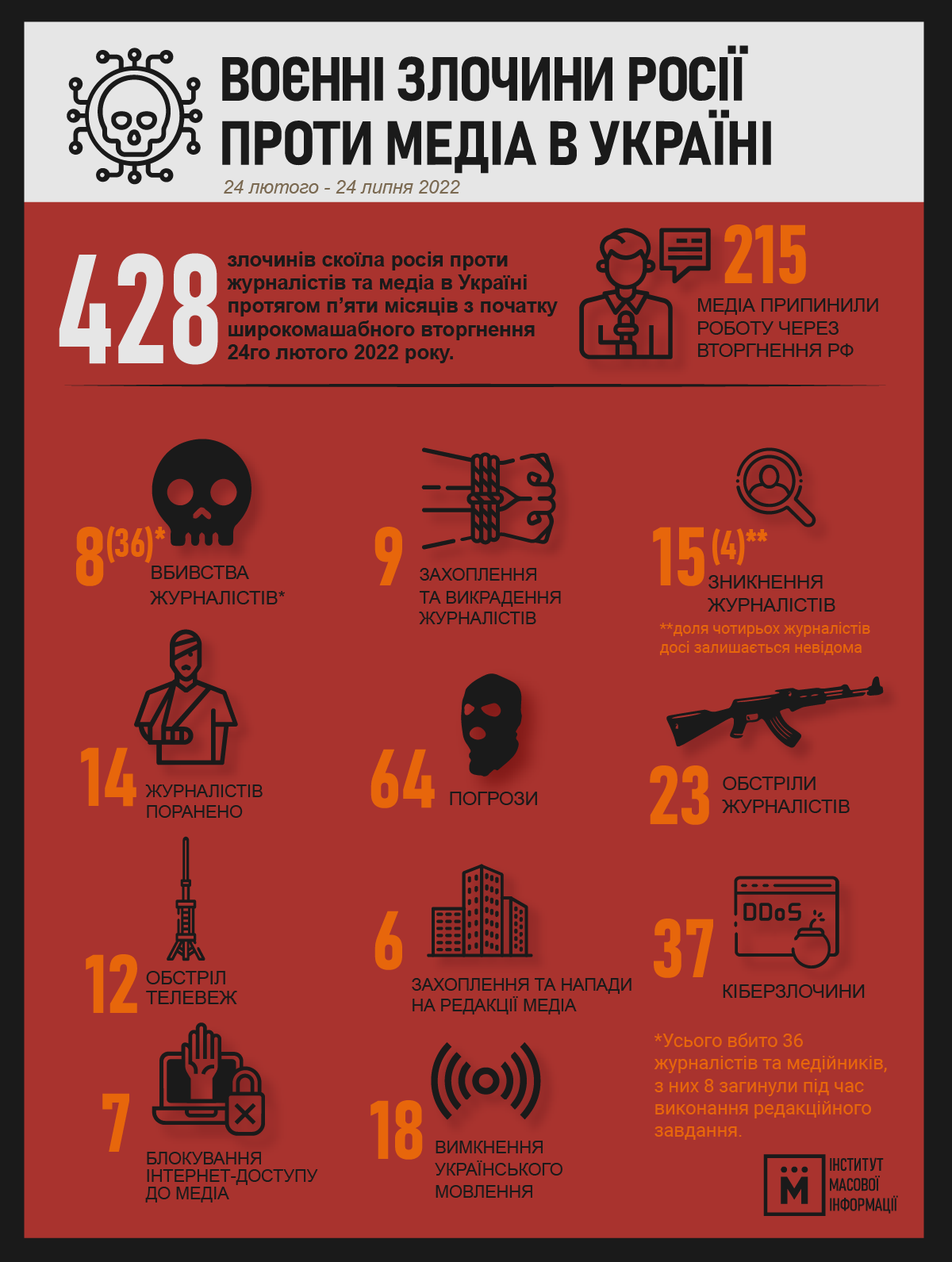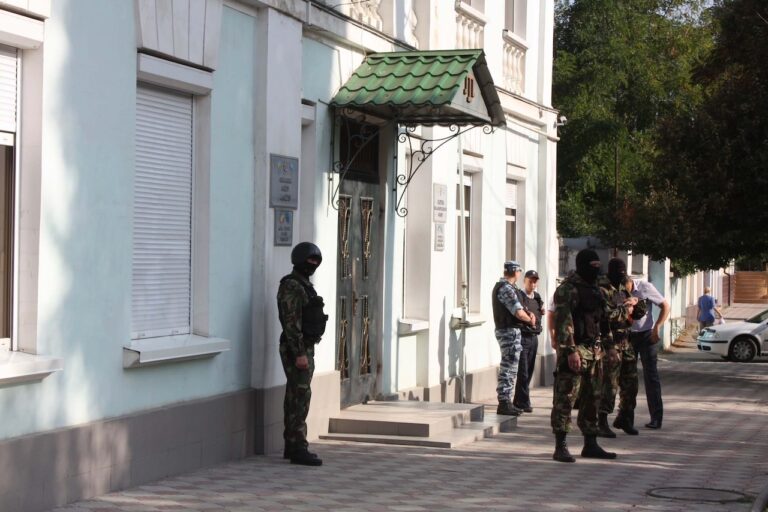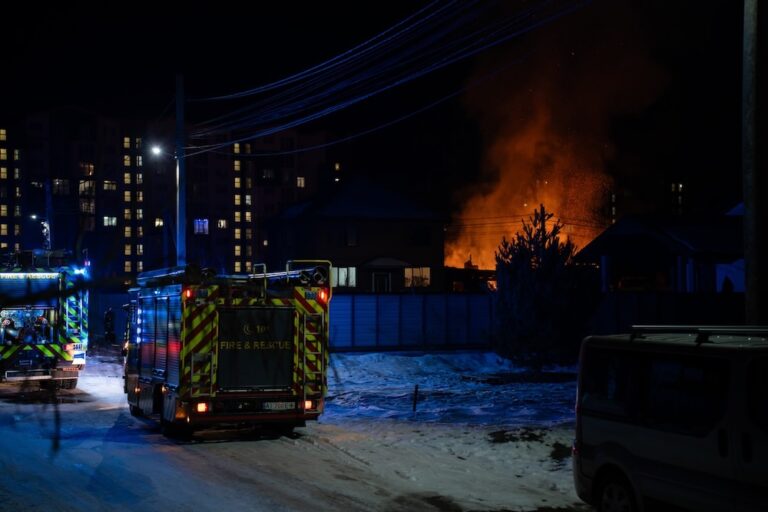As of 24 July, the Russian military have killed a total of 36 journalists in Ukraine, 8 while they were reporting. Fourteen journalists have been injured and four are missing.
This statement was originally published on imi.org.ua on 24 July 2022.
In the five months of the full-scale war, Russia has committed 428 crimes against journalists and the media in Ukraine. This is according to the monitoring conducted by the Institute of Mass Information.
As of July 24, the Russian military have killed a total of 36 journalists in Ukraine; of those, eight journalists were killed in the course of their work. 14 journalists have been injured.
IMI was able to establish that out of 14 journalists who went missing in Mariupol, the fate of three media workers remains unknown. The other 11 mostly left either for the territory controlled by Ukraine or abroad, the minority remains under occupation. So, as of July 24, four journalists are considered missing – three from Mariupol and Dmytro Khyliuk, who disappeared in the Kyiv region during the Russian occupation.

Eight journalists were killed by the Russians in the course of their work. Of those, three were Ukrianian citizens and five foreign ones. They were two women and six men.
- Yevhen Sakun, LIVE channel cameraman, deceased on March 1 in a Russian missile strike on a TV tower in Kyiv.
- Brent Renaud, former The New York Times correspondent, and Time reporter, shot by the Russians on March 13 at a checkpoint in Irpin.
- Pierre Zakrzewski, Fox News cameraman, deceased on March 14 in a Russian shelling attack on Horenka village, Kyiv region.
- Oleksandra Kuvshynova, Ukrainian fixer and journalist, deceased on March 14 together with Pierre Zakrzewski in a Russian shelling attack on Horenka village, Kyiv region.
- Oksana Baulina, journalist for the Russian The Insider, Alexei Navalny’s Anti-Corruption Foundation, deceased on March 23 under Russian artillery fire in Kyiv.
- Maksym Levin, photo reporter, war correspondent. Worked with many international agencies and Ukrainian media outlets, went missing on March 13, found murdered on April 1.
- Mantas Kvedaravicius, Lithuanian filmmaker and documentarist, killed in Mariupol.
- Frederic Leclerc-Imhoff, journalist for the French channel BFMTV, killed by a Russian shelling attack on an evacuation vehicle on May 30 in Luhansk region.
28 media workers were killed as combatants or by Russian shelling, not in the course of their work.
July saw the death of three more media workers who had gone to defend Ukraine. They include Volodymyr Datsenko, journalist of the “Road Control Vinnytsia” NGO, volunteer and defender of Ukraine, who was killed by a missile strike on Vinnytsia on July 14. As well, the presenter for the musical TV channel M2 and an Armed Forces of Ukraine serviceman Karim Gulamov, who was killed on the front line. Mykola Rachok, InfoCar journalist, defender of Ukraine, was killed on the frontline.
- Oleksandr Lytkin, KNK Media journalist, deceased on February 13 in a shelling attack on Romanivka village by Russian troops.
- Dilerbek Shakirov, civilian journalist working for the Navkolo tebe informational weekly, shot from an automatic rifle on February 26 in Kherson suburbs;
- Serhiy Pushchenko, graphic artist and painter, culturologist, Honored Artist of Ukraine, National Journalists Union of Ukraine member, award-winning journalist, volunteer and ATO veteran, killed on March 2 in Vasylkiv together with his territorial defence comrades;
- Viktor Dudar, war journalist, deceased on March 6 in a battle with Russian invaders near Mykolaiv;
- Pavlo Li, actor, “Dom” channel host, joined territorial defence forces at the beginning of the war, deceased on March 6 near Irpin while helping evacuate civillians;
- Viktor Dedov, “Sigma” channel cameraman, killed on March 11 in Mariupol as a result of a shelling attack on a building;
- Oleh Yakunin, Zaporizhzhia misto.zp.ua website editor, deceased on March 18 defending Ukraine from Russian invaders;
- Lilia Humyanova, journalism tutor and the head of the art department of Livoberezhny District House of Children’s and Youth Creativity, killed on March 19 in a Russian shelling attack on Mariupol;
- Yurii Oliynyk, Channel 24 cameraman, deceased on March 23 in a battle near Popasna village, Luhansk region;
- Serhiy Zaikovskyy, essayist, historian, translator, deceased on March 24 in a battle with Russian invaders near Kyiv;
- Denys Kotenko, Ministry of Veterans Affairs press office employee, deceased on March 24 in a battle with Russian invaders near Kyiv;
- Yevhen Bal, journalist, author, volunteer, died under torture at the hands of Russian troops on April 2 in Mariupol;
- Roman Nezhyborets, Chernihiv’s “Dytynets” channel video engineer, killed by Russian troops in April in Yahidna village near Chernihiv;
- Zoreslav Zamoiskyy, body with signs of violent death found on April 13 in Bucha.
- Vira Hyrych, RFE/RL journalist, killed in a Russian shelling attack on Kyiv on April 28.
- Oleksandr Makhov, journalist for Ukraine, Ukraine 24, and Dom TV channels, killed by shelling on May 4. Donbas war veteran. Went back to the frontline with the beginning of the full-scale Russian aggression in 2022.
- Natalia Kharakoz, died in Mariupol under Russian blockade, journalist, author, member of NUJU and the National Union of Writers of Ukraine, head of “Azovye” literature club.
- Yevhen Starynets, former manager of Suspilne’s Cherkasy branch, killed on April 30 in a battle for Popasna (Luhansk region).
- Maksym Medynsky, communications officer, serviceman, died tragically while defending the country.
- Oksana Haydar (pseudonym Ruda Pani), killed by a Russian artillery strike on Shevchenkove village, Brovary district, Kyiv region, between March 11 and 12.
- Kostyantyn Kits, Lutsk’s “Avers” channel cameraman, killed on the frontline defending Ukraine.
- Ihor Hudenko, video blogger, found dead in Kharkiv on February 27, proclaimed biologically dead by doctors. According to the doctors, the death was not violent. Ihor Hudenko was buried on April 7 by the state burial service.
- Vitaliy Derekh, Ternopil journalist and UAF serviceman, killed in action on May 28.
- Roman Zhuk, photographer and videographer from Mukachevo, killed in the war with russia in May.
- Oleksiy Chubashev, war correspondent, author and host of military program “Recruit.UA,” former head of Armiya FM, and UAF serviceman, killed on the front line on June 10.
- Volodymyr Datsenko, journalist of the “Road Control Vinnytsia” NGO, volunteer and defender of Ukraine, killed by a missile strike on Vinnytsia on July 14.
- Karim Gulamov, presenter for the musical TV channel M2 and UAF serviceman, killed on the front line.
- Mykola Rachok, InfoCar journalist, defender of Ukraine, killed on the front line.
In the fifth month of Russia’s full-scale war against Ukraine, IMI has recorded cases of firing on journalists, threats, cybercrimes, the blocking of access, and media outlets closing down due to the war.
The occupiers continue to threaten Ukrainian journalists. In total, IMI has recorded 64 cases of threats and harassment of journalists and the media. Namely, during the fifth month since the start of the full-scale war, editorial offices of the Zaporizhzhia publications 061.ua and inform.zp.ua have received threats from russia. There is nothing new in the threats, they are repeats: criminal prosecution and imprisonment. It should be noted that these media outlets have been receiving such threats for several months in a row.
Regarding cyberattacks: in July, Russians attacked the foreign broadcasting platform for several days in a row in order to block the “FreeDom” telethon, and also disrupted the “FreeDom” telethon’s YouTube stream through mass copyright strikes.
In addition, hackers deleted the Facebook account of Prestupnosti.NET chief editor Anatoly Chubachenko and the media outlet’s YouTube channel. The editors believe that this is all the work of Russian special services or Russian hackers, since the attackers tied the hacked Facebook account and YouTube channel to Russian email addresses. According to the chief editor, the YouTube channel had many videos about captured Russian soldiers, the Ukrainian army destroying Russian equipment, and the media outlet actively supports Ukraine and debunks Russian fakes in every possible way. Also, …



